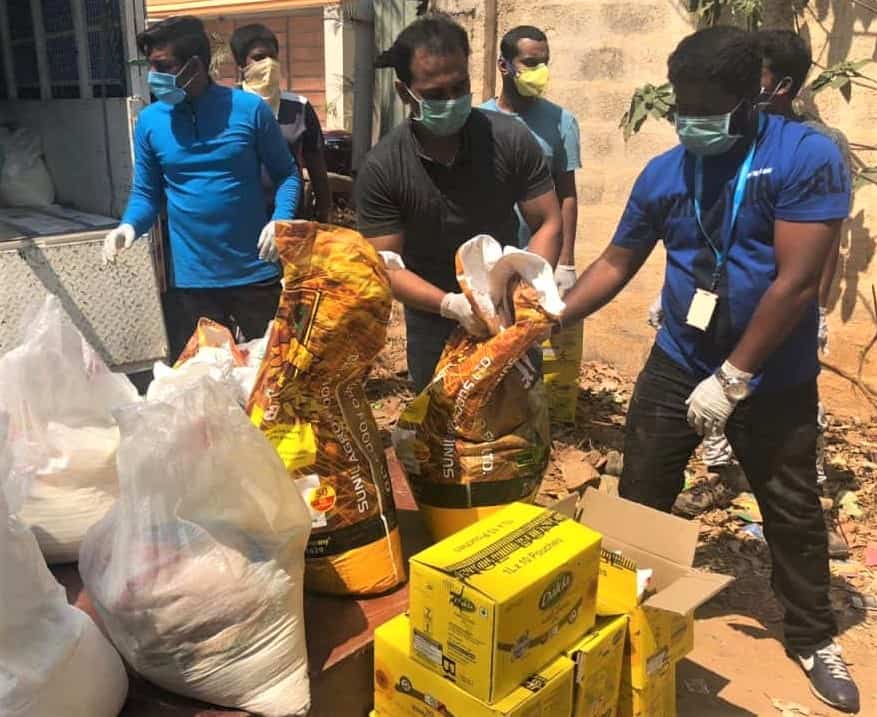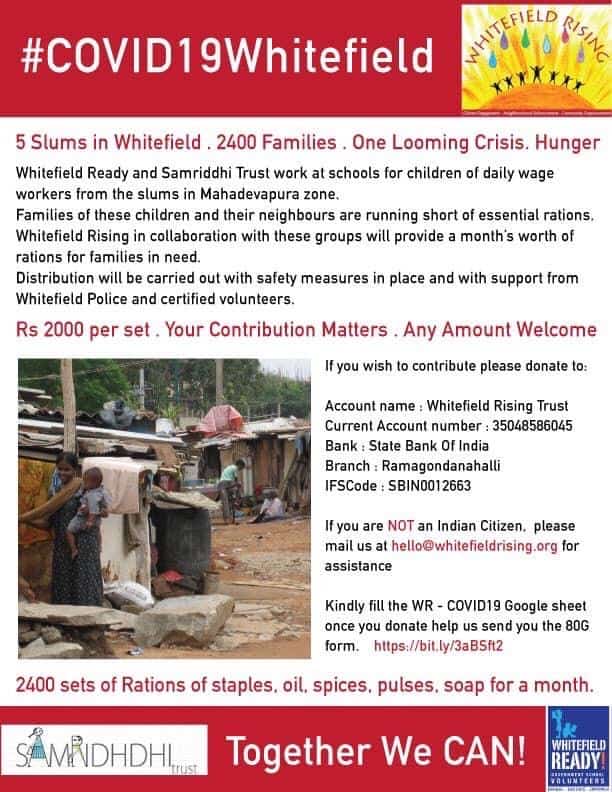
Whitefield Rising volunteers distributing groceries in Mahadevapura Zone. Pic Credit: Whitefield Rising
In this series, various individuals, citizen groups and RWAs explain how they have dealt with the COVID-19 crisis in a constructive manner. In this first part of the series, a volunteer of Whitefield Rising collective describes the measures they took.
March 10, 2020, marked the seventh anniversary of the citizen movement Whitefield Rising (WR). But celebrations were muted – rather, non-existent. Anxiety and an eerie silence had gripped Whitefield as news trickled in about the arrival of COVID-19 in our neighbourhood.
An MNC employee who returned from the United States via Dubai a week ago had tested positive for the virus the previous day. Around noon on March 10, health officials instructed the school that his child attended, to declare a holiday. By evening, the student and her mother were also declared infected by COVID-19.
Phones buzzed, e-mails were shot, messages arrived! What followed from our collective was a measured response – it was time to get into battle mode and combat rumours. Our volunteers connected with the residential community, the school management, news reporters and government officials over phone. They started conveying relevant and accurate information through Facebook, Twitter, WhatsApp and other channels.
Publishing a comprehensive guide
On March 11, the World Health Organization (WHO) declared COVID-19 a pandemic. It was time to prepare and avoid panic. The six-member communication team of WR worked through the night to compile a comprehensive guide. The content was quickly edited and reviewed by a team that included a doctor.
Introducing the guide, Zibi Jamal, a member of the communication team, wrote, “It is our attempt to share best practices to help contain the spread of this contagious virus which is currently in our own midst.” The three-page PDF document, along with a link to the online version, was promptly circulated among Bengalureans.
The document listed helpline numbers, referred to guidelines issued by the government, gave tips on washing hands and wearing masks, and explained why social distance had to be maintained.
Combating misinformation
WR’s Facebook group, a closed group with 27,000-plus members, was getting flooded with random posts – unverified messages about suspected cases, government directions or shutdown of grocery shops. The group admins verified these messages with officials, and scrapped any video, photo or text that seemed suspicious or misleading.
Meanwhile, we also tweeted curated information, ranging from best practices advocated by WHO to the Karnataka government’s COVID-19 dashboard. WhatsApp groups managed by WR volunteers were fed with official circulars and credible news links. In the subsequent weeks, media bulletins issued by the government were shared regularly with hundreds of residents.
Letter to the government
By mid-March, state government had initiated contact tracing and quarantining of those affected. It had shut down schools and malls, and banned gatherings of more than 100 people. However, tech parks remained open; Metro and buses continued to ply.
To public health experts in Whitefield, ‘break the chain’ seemed to be the right course of action to ‘flatten the curve’. On WR’s letterhead, a letter was sent to the Karnataka Chief Minister, urging him to make work-from-home mandatory for IT companies. A copy of the e-mail was sent to the Commissioner, Health & Public Safety. The letter stated, “… with the number of cases rising especially among people from IT industry and their subsequent transmission to friends and family/within the community, we think further distancing at workplace is essential at the earliest.”
Supporting residents during lockdown
On March 22, Sunday, a Janata Curfew was observed across India, and a countrywide lockdown followed on Wednesday. Distress calls poured in. In response, WR volunteers liaised with the Bengaluru Central MP, the DCP heading Whitefield Police Division as well as BBMP officials on matters as wide-ranging as passes for STP operators and permission for residents to feed stray dogs.
Supplying groceries to migrant workers
A week later, Whitefield Rising Trust announced a relief drive for migrant workers living in slums in Mahadevapura Zone. For this project, we collaborated with two organisations with which we had partnered for many years – Whitefield Ready and Samridhdhi Trust. Whitefield Ready has strived to improve the quality of education, hygiene and civic awareness at local government schools since 2008. And Samridhdhi Trust has worked with over 4,000 out-of-school migrant children in Bengaluru, Pune and Delhi NCR since 2009.
Our project involved raising funds, sourcing groceries and household items (soap, toothpaste, etc.), packing them, ascertaining requirements, and distributing them. A coordination group was set up and volunteers were assigned responsibilities. “Our mission is need-based food and water delivery to hundreds of families,” said Sumedha Rao, the project lead. “We are working with the police and several organisations to ensure supplies are reaching the right places.”
To raise funds, a poster was designed and circulated in a jiffy. An e-newsletter went out to over 3,000 subscribers. Describing the initiative, Nitya Ramakrishnan wrote in the newsletter, “We are currently overwhelmed at the separate crisis unfolding because of the lockdown—thirst and hunger among daily-wage workers. Let’s all do our best to help in these tough times!”

Poster to raise funds for supplying essentials to migrant workers. Credit: Whitefield Rising
Money came into the bank accounts of WR Trust and Samidhdhi Trust from far and near. Sweden-based Malin Isaksson offered to support, “I read about your food ration action on Facebook and would like to help. I have sent a little sum, as I am only a regular worker. I have no fortunes to spare unfortunately. But a little is better than nothing. Hope it helps.” Citing this example, WR Volunteer Ritu George said, “It is amazing to see the good side of humanity! Amazed at the generosity of such people. Truly humbled!”
Volunteer Bapan Debbarma, who runs a chain of cafes that are now shut because of the lockdown, said, “On the 6th, I collected eight kits of groceries from WR team (one kit would cater to a family of four for a month). I took them to those in distress in Indiranagar, Koramangala, BTM Layout and Shanthinagar.”
Supplying cooked food
What began as grocery supply quickly grew into a larger programme of distributing ready-to-eat food to those who did not have the facility to cook. This became possible when Asad Ali, a Good Samaritan, came on board on March 29. Asad and his partners run Food Crates, a chain of kitchens.
On April 5, a WR blog mentioned that Asad’s team of volunteers were working round-the-clock to supply 3,000-plus food packets per day. WR volunteers had set up an IVRS to respond to the incessant calls requesting food.
Word spread rapidly, and the drive went beyond Mahadevapura Zone. In a heart-warming gesture, 25 children without food near Hebbal were delivered dinner on April 4, and groceries the following day. This was facilitated by Rotary Club.
“WR’s core objective is to make a difference to the neighbourhood,” pointed out Devyani Trivedi, a volunteer. “In these times of global crisis, we are doing our bit by acting locally.”
Excellent work by Whitefield Rising and its volunteers. Hats off to them..
In these dire times it is wonderful to see such noble gestures. This is the best way to rise to the occasion